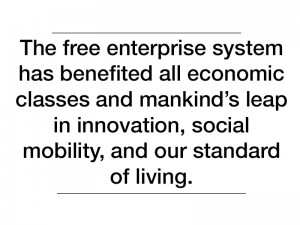Each day we participate in the most just and free market system in the world. The iPhone we bought to talk to friends, the Pepsi we drank to keep us awake to study, the paycheck from work, are an integrative part of the free market. Dinesh D’Souza, former President of The King’s College noted free market “capitalism satisfied the Christian demand for an institution that channels selfish human desire toward the betterment of society.”
 Author Michael Novak documents the origin of free enterprise to the Catholic’s creation of Canon Law, which led to a common market and law system by establishing “jurisdictions of empire, nation, chartered city, guild [for] merchants, and entrepreneurs. It also provided local and regional arbitrators, jurists, negotiators, and judges. Now gears for windmills, harnesses for beasts of burden, ocean-going ship rudders, eyeglasses, and ironwork” were invented with the free flow of trade and ideas. Later the “Protestant Work Ethic” would bring ferocity for free markets documented in Max Weber’s 1905 book, The Protestant Ethics and the Spirit of Capitalism. Book critic Tom Butler-Bowdon states Weber makes a compelling argument that Protestants made free markets worthy and morally just because “of the spirit of progress; the love of hard work for its own sake; the orderliness, punctuality and honesty; and the belief in a higher calling.”
Author Michael Novak documents the origin of free enterprise to the Catholic’s creation of Canon Law, which led to a common market and law system by establishing “jurisdictions of empire, nation, chartered city, guild [for] merchants, and entrepreneurs. It also provided local and regional arbitrators, jurists, negotiators, and judges. Now gears for windmills, harnesses for beasts of burden, ocean-going ship rudders, eyeglasses, and ironwork” were invented with the free flow of trade and ideas. Later the “Protestant Work Ethic” would bring ferocity for free markets documented in Max Weber’s 1905 book, The Protestant Ethics and the Spirit of Capitalism. Book critic Tom Butler-Bowdon states Weber makes a compelling argument that Protestants made free markets worthy and morally just because “of the spirit of progress; the love of hard work for its own sake; the orderliness, punctuality and honesty; and the belief in a higher calling.”
As history tells us, the free enterprise system has been the catalyst for the greatest strides in innovation, social mobility, and the standard of living. In a free enterprise system, allocation of goods through trade is not an exploitation of buyers by sellers, rather a mutual agreement of value between two consenting parties. However, many of today’s liberal-progressives argue free enterprise is unethical resulting in a mal-distribution of wealth. They claim markets cause the rich to get richer and the poor to get poorer. However, history has shown societies prospered from free market expansion which created a better standard of living for all income classes. When President Kennedy cut taxes for the upper class the economy blossomed. Kennedy remarked, “A rising tide lifts all boats.” According to economist Arthur Laffer, the US’s “purchasing power of the median income family rose to $54,061 in 2004, an $8,228 real increase since 1980. The middle class is not disappearing…it is getting richer.” The poor have also benefited from these booms. A Treasury study on income mobility in the US from 1996 to 2004 found the bottom 20% of wage earners experienced a 109% (inflation adjusted) increase in income.
Critics of free enterprise often cite Sweden as a model of how socialism can work. Having a mother from Sweden and having visited many times, I know Sweden is a lovely country, but if Sweden is socialism’s best argument, then the cases against socialism are many. It is true Sweden has relatively no poverty. On the other hand, economist Milton Friedman noted, “That is interesting because in America, among Scandinavians, we have no poverty either.” Likewise less than 7% of Swedes and Swedish Americans live in poverty. However, the similarities end there considering how wealthy American Swedes are compared to their Swedish counterparts. A Swede’s average income per year is $36,600 while an American Swede’s average income per year is $56,900 according to author Kevin Williamson. A typical Swedish family would live in an 800 square foot apartment and own one car, while a typical Swedish-American family would own a 3000 square foot home and own two cars.
In addition, according to Socialism by Williamson, Sweden’s GDP per capita was 20% higher than that of the US in 1980, but in 2001 not only was the US’s GDP per capita higher, it was higher by an overwhelming 56%. Sweden also has more social rigidity than the US. Ironically, America is more egalitarian than Sweden. While income may be more equally distributed in Sweden, the US has distributed wealth more equally. Income and wealth are correlated in the US by high paying careers or entrepreneurship. In Sweden you are more likely wealthy because you inherited it.
The free enterprise system has benefited all economic classes and mankind’s leap in innovation, social mobility, and our standard of living. On the other hand, collectivist societies have stifled innovation, while creating a rigid social mobility, driving down a lower standard of living. President Ronald Reagan once said, “Socialists ignore the side of man that is the spirit. They can provide you shelter, fill your belly with bacon and beans, treat you when you’re ill, all the things guaranteed to a prisoner or a slave. They don’t understand that we also dream.” Similarly, Timothy 1:7 states, “For God hath not given us the spirit of fear; but of power, and of love, and of a sound mind.” The choice is clear. We must continue to dream.
